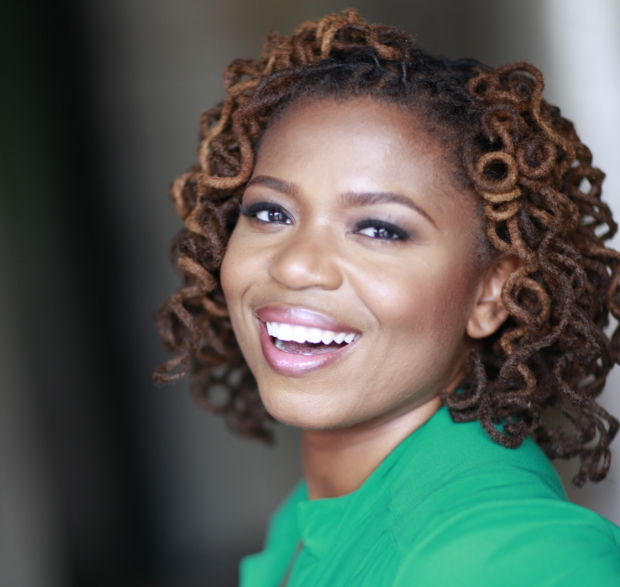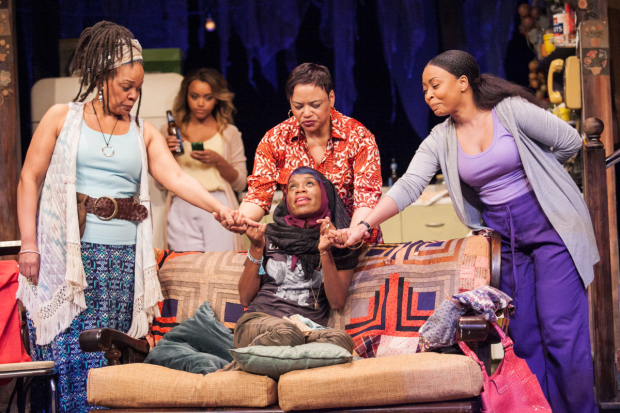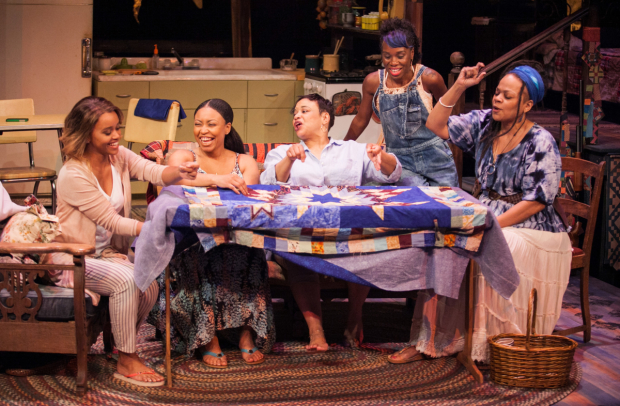Katori Hall Patches Together a Family History in The Blood Quilt
An all-African-American female company brings Hall’s third world premiere of the season to Arena Stage.
The 2014-15 theater season has seen the birth of three brand-new plays by Katori Hall. Her Rwanda-set drama Our Lady of Kibeho premiered at New York's Pershing Square Signature Center this past November, Pussy Valley debuted just this month in Minneapolis, and her new family play, The Blood Quilt, tops off the hat trick at Washington, D.C.'s Arena Stage.
"Every birth is very different," said Hall, as rehearsals in D.C. were drawing to a close. "Sometimes it's a breech birth and you're like, 'Get this thing turned around!'" she joked. While all of her "children" come into the world with vastly different identities, the one thing they all share is a distinctly African-American female voice — a gap in the theatrical landscape that Hall has consciously set out to fill.
The Blood Quilt in particular follows a group of four African-American sisters who reconnect at their childhood home off the coast of Georgia. The family's tradition of quilting — a craft Hall's grandmother introduced her to — brings the group together as they pay tribute to their recently deceased mother. While the fictional story settles comfortably in its Southern roots, the playwright expects its content to reach far beyond the Mason-Dixon line.

How were you first introduced to the world of quilting?
My grandmother has quilted me pieces throughout my entire life. It was kind of something that I took for granted, like, oh, Big Momma's gonna give me a quilt. And I put it on my bed or take it to college. It wasn't until about 2013 — I was living in L.A. and there was a fabric store up the street from me that gave quilting lessons, and I was like, you know what, I always wanted to quilt, let me go and learn. So I took some private lessons from this place called "Sew Modern" and then I was like, my grandmother can do better quilting than these women. So I ended up flying back to Memphis over the holiday and I spent a couple of weeks with my grandmother learning how to hand-piece quilts. She had this quilt that she had been working on since she was sixteen, and at the time she was eighty-seven. I had [been working] on the play for a while and it just really locked in when I was able to truly learn from a craftsman's perspective how to put together these works of art.
Why did this strike you as something you wanted to put onstage?
I thought it was a beautiful art form. I knew about the long tradition of quilters in my family, so I wanted to use that as a way into talking about more complex issues in terms of what's going on in certain parts of the South when it comes to being able to hold on to their cultural traditions. In 2009 I ended up visiting Sapelo Island down off the coast of Georgia. I was doing research for another project, and the experience of going down there really stayed with me. There was no bridge to the mainland, so these people had been able to kind of keep these Africanistic cultural traditions because they had never been tainted by America. I felt like these people had so much in common with the people I grew up around. I also ended up doing my genealogy, and I learned that my great-great-great great-great-grandmother was born in South Carolina around 1845. [There were] all these pieces of history that I wanted to excavate in this particular project, and I wanted to do it through the lens of quilting. My grandmother uses her hands to create these things that keep people warm and make people feel good, and I kind of approach my playwriting in the same way. One is just more tactile than the other.
What was appealing to you about making this a story told by a cast of all women?
A wall of women has always been a dream of mine to see onstage. I come from a family of sisters, so a dynamic of all women is very interesting to grow up in.

(© C. Stanley Photography)
Do you write with the desire to create roles for African-American actresses?
Definitely. It's actually the reason why I write. I'm very lucky that I have a mission statement. Some writers are just like, I'm writing to make myself feel good or explore the world. I'm like, no, I write because I want to see more African-American women onstage. When I was a student, I was taking an acting class and my teacher made us find a play that has a scene for our type. Me and my scene partner were two young African-American women, and we couldn't find anything. So I [decided], I'm going to commit myself to trying to put plays on the shelf that have scenes for young African-American women. It kind of came from a selfish place, but as I've stepped away from acting, it's shifted to something that's more altruistic. I just see that we're not given as many opportunities. I think the American theater is still stuck in the "only one" syndrome. They'll only produce one black play a season. So a lot of women, since there tends to be that one role, they're competing against two hundred other African-American women for the role. We need to multiply this by a hundred so a hundred more people can have that opportunity.
What are you hoping audiences will take away from their experience with the group of women you've created for The Blood Quilt?
I write from a place of wanting to see myself in the mirror that is the American stage. I kind of write myself into existence. But because my particular experience is the African-American Southern female experience, it's very specific, and yet it's very universal. That's really what I want people to be able to see. I just want everyone to see themselves in these sisters because it really is about family, it's about coming together in times of need, and trying to figure out how to survive in a world that is constantly shifting. I think we all can see that we are a part of that bigger American story, whether we're white, black, or green.

(© C. Stanley Photography)








